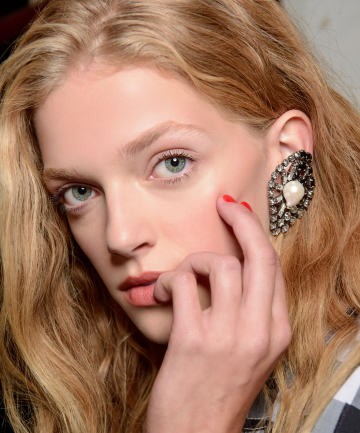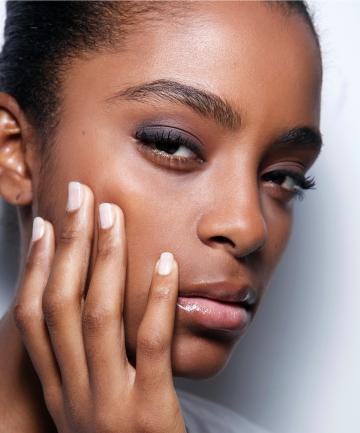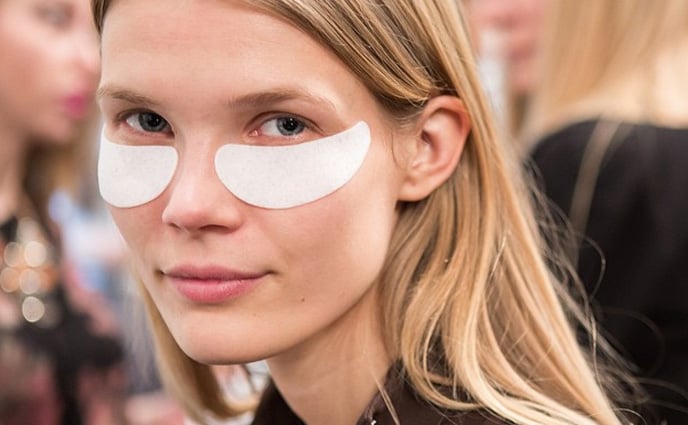You're tired, overworked and you've just noticed that you've developed dark circles under your eyes — and now that's stressing you out even more.
Don't fret too much, though — dark circles are a fairly common problem in both women and men. "I encounter patients every day, both male and female, who are troubled by darkness, shadows, heaviness. No gender is spared!" says Dr. Michael Eidelman, medical director at Chelsea Skin and Laser.
So how exactly do you treat this problem — besides just hiding them with a great concealer, that is? We spoke to Dr. Eidelman to find out.
Image via Imaxtree
Don't fret too much, though — dark circles are a fairly common problem in both women and men. "I encounter patients every day, both male and female, who are troubled by darkness, shadows, heaviness. No gender is spared!" says Dr. Michael Eidelman, medical director at Chelsea Skin and Laser.
So how exactly do you treat this problem — besides just hiding them with a great concealer, that is? We spoke to Dr. Eidelman to find out.
Image via Imaxtree
Well, there's no simple answer. It could be a combination of things, from allergies to being overtired. "Our lifestyle choices show signs on the face," explains Eidelman. "Others are genetically predisposed to discoloration under the eyes. Sometimes, structural changes around the eye cause more shadows which make the skin appear darker in the reflection in a mirror or in a photo."
Skin tone definitely plays a part: "Darker skin tones tend to produce more pigment in this area," says Eidelman. "The skin is very thin and the underlying veins will be easier to see in those with a fairer skin tone or if there's minimal fatty tissue." He adds, "Age is also a factor. Medically, under eye discoloration could be caused by an iron deficiency or certain thyroid issues."
Image via Imaxtree
Skin tone definitely plays a part: "Darker skin tones tend to produce more pigment in this area," says Eidelman. "The skin is very thin and the underlying veins will be easier to see in those with a fairer skin tone or if there's minimal fatty tissue." He adds, "Age is also a factor. Medically, under eye discoloration could be caused by an iron deficiency or certain thyroid issues."
Image via Imaxtree
Well, you really just have to listen to your body. Getting more rest, staying hydrated, keeping to a healthy diet and regular medical screenings (and of course sun protection!) will help a lot to keep those dark circles at bay, according to Eidelman. "I recommend the use of a good quality eye cream to help hydrate the skin around your eyes," he says. "I've found that a prescription retinoid is helpful because it promotes cell turn over keeping the skin fresh."
That said, if you use a retinol eye product, be careful: "It's vital that patients protect with sunscreen to prevent the area from darkening further and remember the retinoids make the skin more sensitive to the sun," warns Eidelman.
Image via Imaxtree
That said, if you use a retinol eye product, be careful: "It's vital that patients protect with sunscreen to prevent the area from darkening further and remember the retinoids make the skin more sensitive to the sun," warns Eidelman.
Image via Imaxtree
In addition to finding the right eye cream, Eidelman says you could try various treatments such as chemical peels, IPL laser treatments, or a hyaluronic acid dermal filler. Speak to your dermatologist about which one is the right one for you.
"Treatments can help lighten the area but will require more than one treatment with follow up treatments over time. Patients tolerate all the treatments well with minimal to nearly no true down time," says Eidelman. One thing to look out for? These types of treatments can cause swelling, bruising and redness — though with proper care, they should go away within a week or so.
Image via Imaxtree
"Treatments can help lighten the area but will require more than one treatment with follow up treatments over time. Patients tolerate all the treatments well with minimal to nearly no true down time," says Eidelman. One thing to look out for? These types of treatments can cause swelling, bruising and redness — though with proper care, they should go away within a week or so.
Image via Imaxtree
Yes! Your trusty concealer is still your friend, though Eidelman recommends giving your skin a break for a few days as well, especially if you've had a chemical peel or an IPL session.
Image via Imaxtree
Image via Imaxtree








